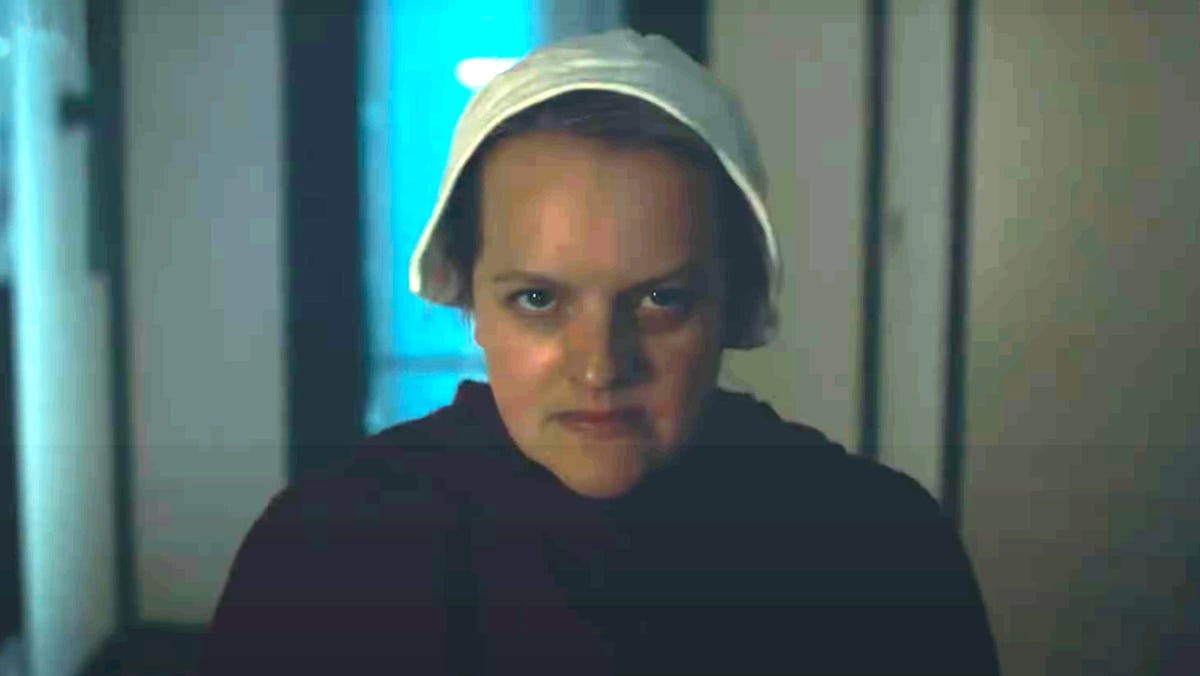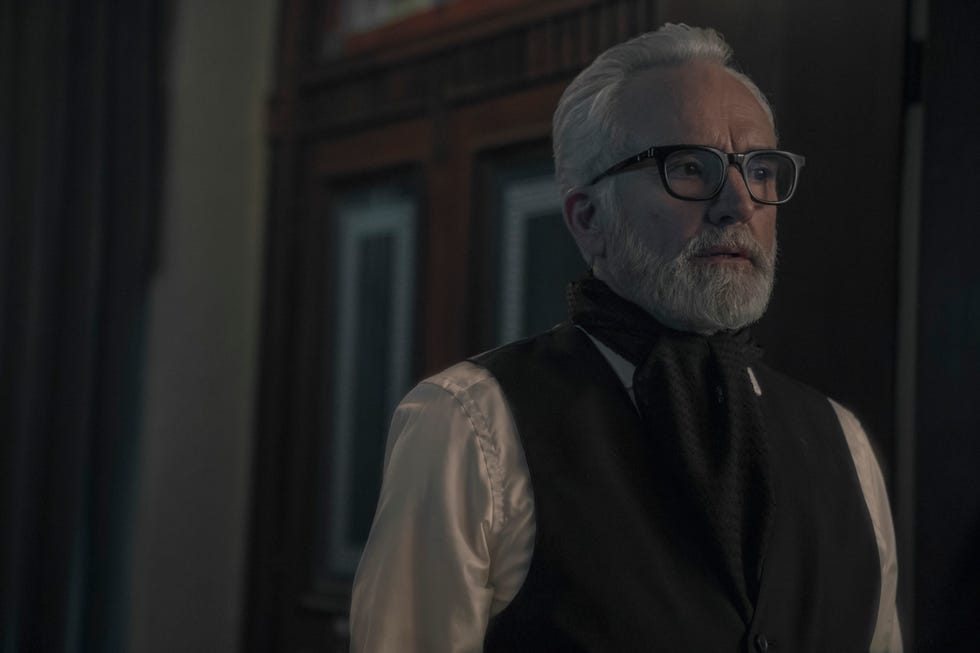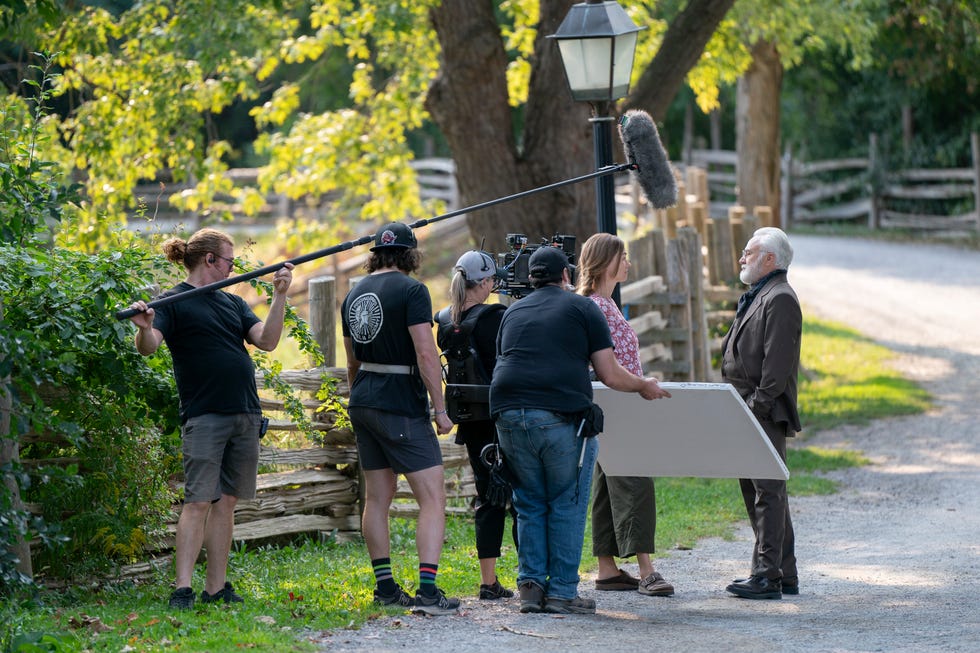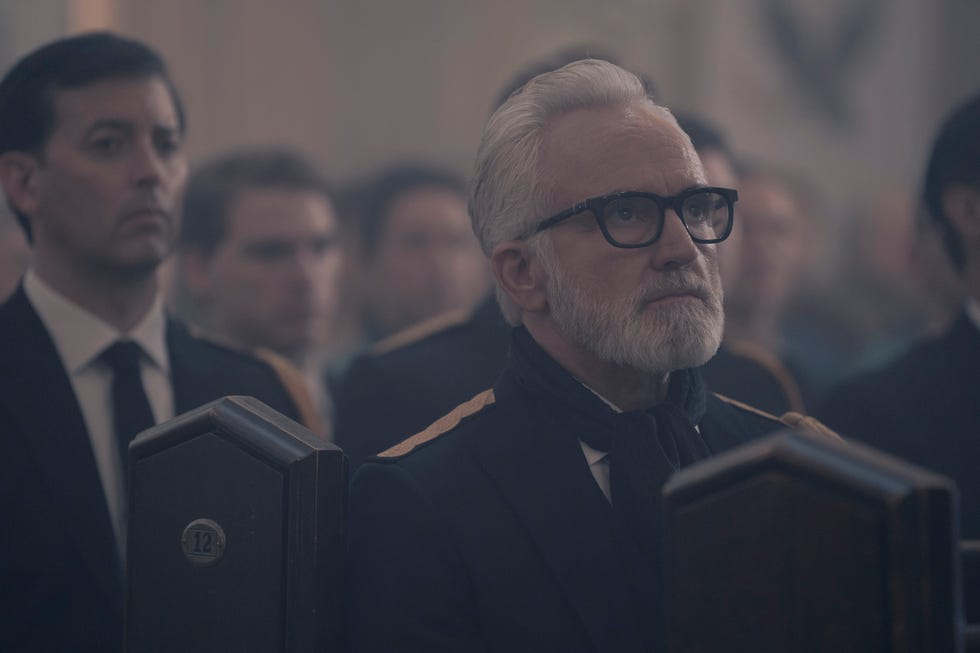Bradley Whitford Explains Commander Lawrence’s Bold Decision on <i>The Handmaid’s Tale</i>

Spoilers below.
The penultimate episode of The Handmaid’s Tale puts multiple characters in the crosshairs of the war against Gilead. One of them is High Commander Lawrence (Bradley Whitford), who makes the ultimate sacrifice when he literally blows up the fabric of the totalitarian state he helped create. “I’m an economist, I’m not James Bond,” Lawrence says before agreeing to the daring mission. Unlike 007, Lawrence can’t parachute from the plane full of commanders (including Nick Blaine) before it explodes.
Having joined The Handmaid’s Tale in its second season, Whitford’s Lawrence has played antagonist and ally to June Osborne (Elisabeth Moss) throughout the series. In the final season, Lawrence learns his reforms are being used to lure former Gilead residents back to the country that abused and tortured them under the banner of change. When enough people have returned, the Gilead leadership will revert to the oppressive rule of law. Siding with the Mayday resistance is an act of self-preservation to stave off his future execution; Lawrence doesn’t volunteer to give his life for the cause. Instead, he intended to leave the bomb on the plane before the commanders arrived, but when they showed up early, he had no way to exit without drawing attention. Lawrence climbs the stairs, puts his hand on his heart, and says a silent farewell to June in a tear-inducing, emotionally charged exchange.
It was a bittersweet moment for Whitford. Even though this isn’t the first time the three-time Emmy-winner has experienced the conclusion of a long-running TV cultural touchstone, it doesn’t get easier. He first worked with Moss on The West Wing more than 25 years ago and is in awe of her work on The Handmaid’s Tale as both a scene partner and director. (Moss was behind the camera of the penultimate episode and finale.) Whitford speaks fondly of shooting his final scene to ELLE.com. “It was sitting next to Nick on the plane right before it exploded. It was really heartbreaking,” Whitford says. “Max [Minghella] is someone I love with all my heart, and working with Lizzie [Moss], I was just so sad. I feel lucky. A weird mix.”
In fact, when I ask what Whitford took from the set, he doesn’t say a costume, accessory, or object: “I took Max Minghella, and he's tied up in the basement. I make him do monologues for me, but he tells me he's very happy and grateful.” All joking aside, Whitford mentions that he had texted Minghella the day before our conversation, “and told him I missed him.” Like his experience on The West Wing (that iconic cast “texts each other all the time”), Whitford has formed lifelong bonds with his co-stars that starkly contrast the divided Gilead landscape.
Whitford doesn’t just choose politically charged projects, as he has long been using his platform on the campaign trail, calling out hypocrisy, and advocating for reproductive rights (his father was president of the Dane County, Wisconsin chapter of Planned Parenthood). Below, Whitford talks about shooting his final scenes, keeping things light on set, the story’s real-life parallels, and why he’s drawn to political TV shows.

I feel such parental affection for this kid, who I have a very clear memory of—I worry about kids in show business—and she wandered onto the set of The West Wing, and I remember thinking that kid really wants to be here, and she was a ringer. Then she becomes the poster girl for the golden age of television, and then I get to work with her again, all grown up. Very much like Lawrence’s initial condescension about June, I don’t even realize it, but she’s mentoring me. She’s leading me. Leading Lawrence, blowing on the spark of his decency, but leading me as a human being. Lizzie is the least precious, the opposite of a method actor, to the point where it’s ridiculous. I think that is an act of unconscious method acting of the way this extraordinary performer, who is playing June, ends up being the creative center of the show, directing, taking control of all aspects of it, was an amazing thing.
What was it like shooting that particular sequence as Lawrence boards the plane with the bomb and the final goodbye between these characters?It was the second-to-last thing I would shoot. It was a fraught day on the set because, as lucky as I’ve been, it makes me more acutely aware of what kismet it takes for a show to work. So, to say goodbye to one of those experiences, it’s this very weird mix of gratitude and sorrow. Even though we were just pretending, I knew I was kind of saying goodbye to her [Lizzie].
Initially, in the script. I think it was a salute. That [the hand on the heart] was one of the moments [where] Lizzie thinks she’s got it; she knew that was an important moment. This is not humility [on my part]; it’s desperation. You don’t know what works—you really don’t. But I trust her eye.

I feel sorry for the showrunners because the good news and bad news for the showrunners is that you have a bunch of actors who really care [laughs]. I became very anxious about where this was gonna end. I mean, really neurotic about it, like boring my very supportive wife with repetitions about “Where is this going?” I was worried that there was going to be a repetition of what happened to Lawrence before you met him, of being seduced by power, so much so that I talked to [creator] Bruce [Miller] about it. They’re wonderfully collaborative, and that was never where it was going. Before they started writing [season 6], I called [showrunners] Eric [Tuchman] and Yahlin [Chang], and they said, “Oh yeah, come over, we’ll talk. They just started the writers’ room” I just gotta know where this ends, it really means a lot to me. I’m 65 years old; this is a big part of my creative life; I’m not a child. I want to know where this goes. The moment they started talking, I was like, Oh, this is [great]. So I knew.
Is Lawrence’s close connection with Janine’s (Madeline Brewer) daughter the reason why he makes this final sacrifice?I thought one of the tragedies of somebody like Lawrence is that the consequences of what he has done do not hit home until he loses [his wife] Eleanor. It was always very important to me that it was a real love and connection. Julie [Dretzin] made that happen because she was so good [as Eleanor], but I always thought that part of our backstory was that we had lost a child. It was always an opportunity whenever I was around kids, no matter how sort of ornery and Scrooge-y I might appear to be, that there was always the open part in there. I loved that moment with Ever [Carradine], I loved having that with [new wife] Naomi. She was such a joy to work with, and have that just real connection of a lot of unspoken stuff meant a lot to me.

If we were doing another year, it would have been a lot more raucous. So within the reality of the show, very grim scenes, I think it’s a way to deal with the darkness of it. By all accounts, it is everybody’s experience of it and a lot of it that comes from Lizzie. There was no screaming on the set. It was all very loose. Lizzie is not precious, no matter what she has to do. It’s an affirmation for me that it's a confusing thing about performing, because I’ve always found, no matter what the material, keeping it as loose as possible and screwing around as much as possible is the best preparation. I think it opens you up, and when it becomes somber and this anvil of artistry is on you, you can’t act.
It’s only a slight exaggeration, but these are Canadians, the sweetest people on the planet, despite what the current president may be saying. It’s very cheerful, very sweet people saying things like, “Okay, I don’t want to rush you, but I think we should get the nooses on the girls.” The combination of the toughness of the material and the joy with which we got to do it was really bizarre, but I think it’s compensating. It wasn’t disrespectful. It was a remarkably safe place, and the kindness and looseness of it were a big reason for that.
When the show started (before I was on it)—they were shooting in 2016—this idea that women’s access to healthcare would be politicized was remote. I do stuff with Planned Parenthood and this year, there’s 64,000 pregnant rape victims in the United States without access to health care. It is a testament to the necessity of storytelling and the limits of storytelling. It goes to something I’ve always felt; I think part of the reason we’re where we are politically is that I have grown up at a time where [I believed] democracy was inevitable, where, as flawed as it was, an expansion of agency within democracy was inevitable, and a more inclusive society was inevitable. They are not. I think, part of the reason we’re here is we [people who agree with me politically] have tended to think that culture alone is the way you create your moral vision, and the people on the other side have understood that politics is the way you create your moral vision.
Culture is incredibly important, but West Wing won’t help you if you have a pre existing condition, this show's [The Handmaid’s Tale] a big hit, [but it] won’t help you if you’re a 13-year-old rape victim in Ohio. I think at the core of this obviously very dark show is—the way I articulate it—the heart of June's character is this idea that despair is a luxury your children can't afford. Action’s the antidote to despair under the most harrowing of circumstances. This is a fictional circumstance, but you can look all around the world and see people resisting under extraordinary conditions, and you can see it in history. It’s a reminder of the possibility of the kind of resilience we need at this moment. We used to get crap about how paranoid we were being, and how unrealistic it was. Margaret Atwood herself almost put the book aside a couple of times because she thought it was a little outrageous. It turns out it's not.

I always joke that my career is tracking the death of democracy. But none of it is intentional. What’s really funny to me is when West Wing was just an idea, Aaron [Sorkin] had to fight [for it]. The notion was that you couldn’t do a television show about politics. I remember having these conversations with him, and we’re like, ‘it has conflict, it has stakes.’ It’s typical of the way they think in Hollywood, they dismiss a genre if a movie doesn't work: it's idiotic. Now, we've had Veep, Scandal, House of Cards. It’s a very rich arena with high stakes. We see so many iterations of it now, and it was something that was considered to be box office poison.
I don’t know if it’s just because I’m interested in politics or active in advocacy, but I was always thinking of different parallels that make me understand the argument between June and Lawrence about whether we should reform this from the inside; the sort of Hillary [Clinton] wing versus the more radical way of approaching it. It's endlessly fascinating and unfortunately, relevant. I can’t believe it. I am basically a progressive Democrat, and we’re the bed wetters, right? We're the hysterics who always overstate what can happen. Well, there is no diaper big enough. We clearly underestimated, and it's why the show is so, unfortunately, prescient. What we’re seeing is the weaponization of a perverted idea of Christian faith to use as a delivery system for the accumulation of power. This stuff’s right out of the fascism coloring book. It’s flabbergasting that we’re in this moment, but again, I hope people find some hope and inspiration in the fight against it.
This interview has been edited and condensed for clarity.
elle




